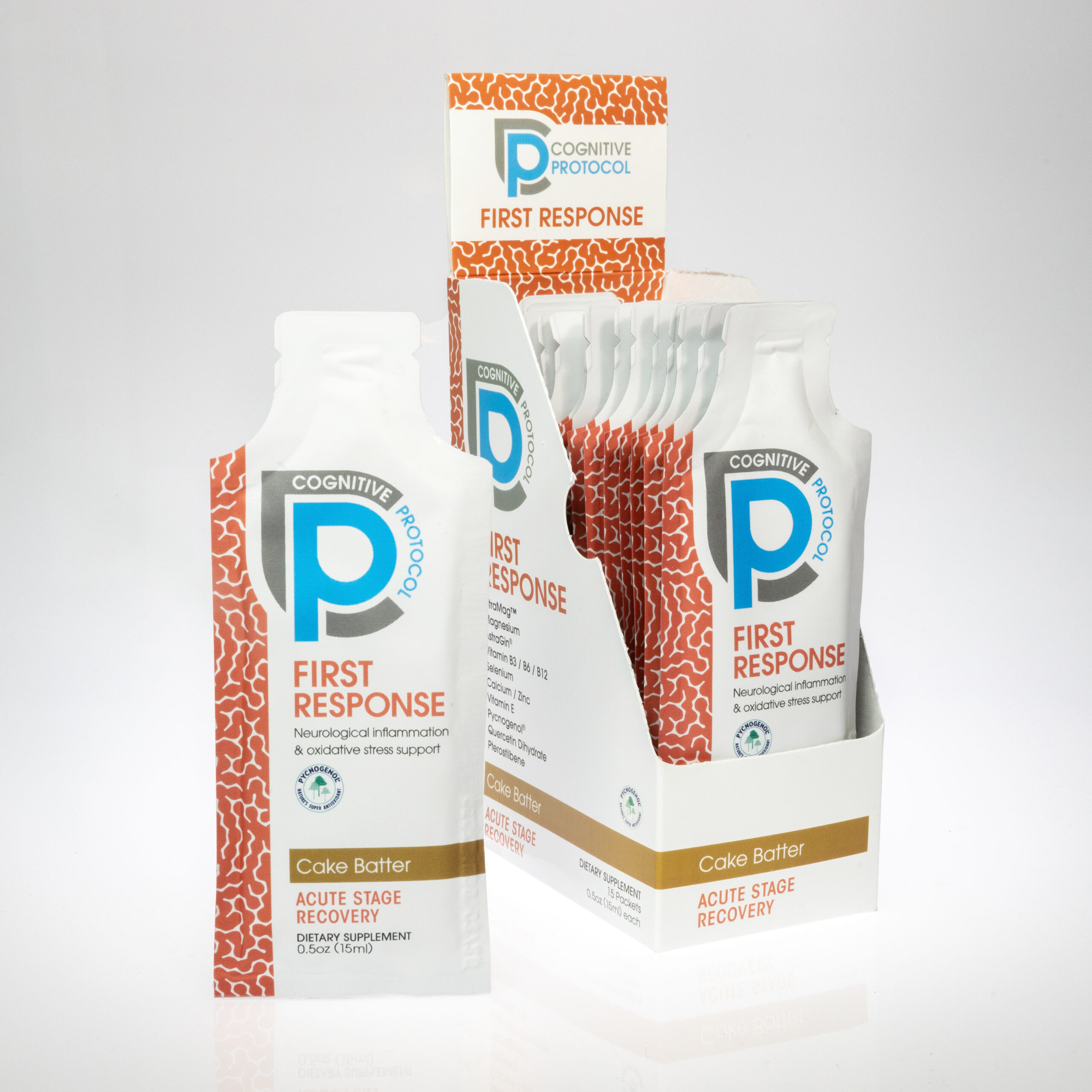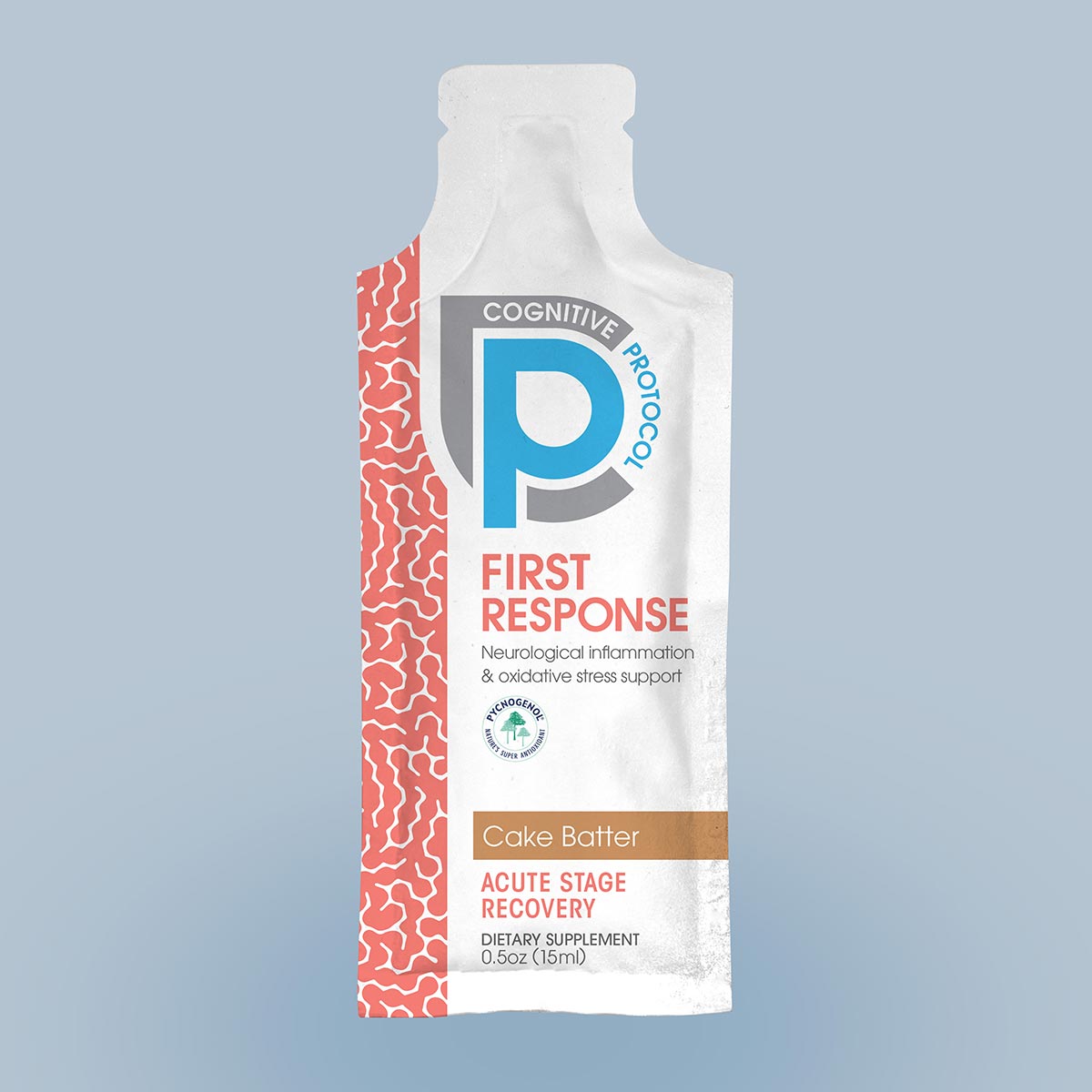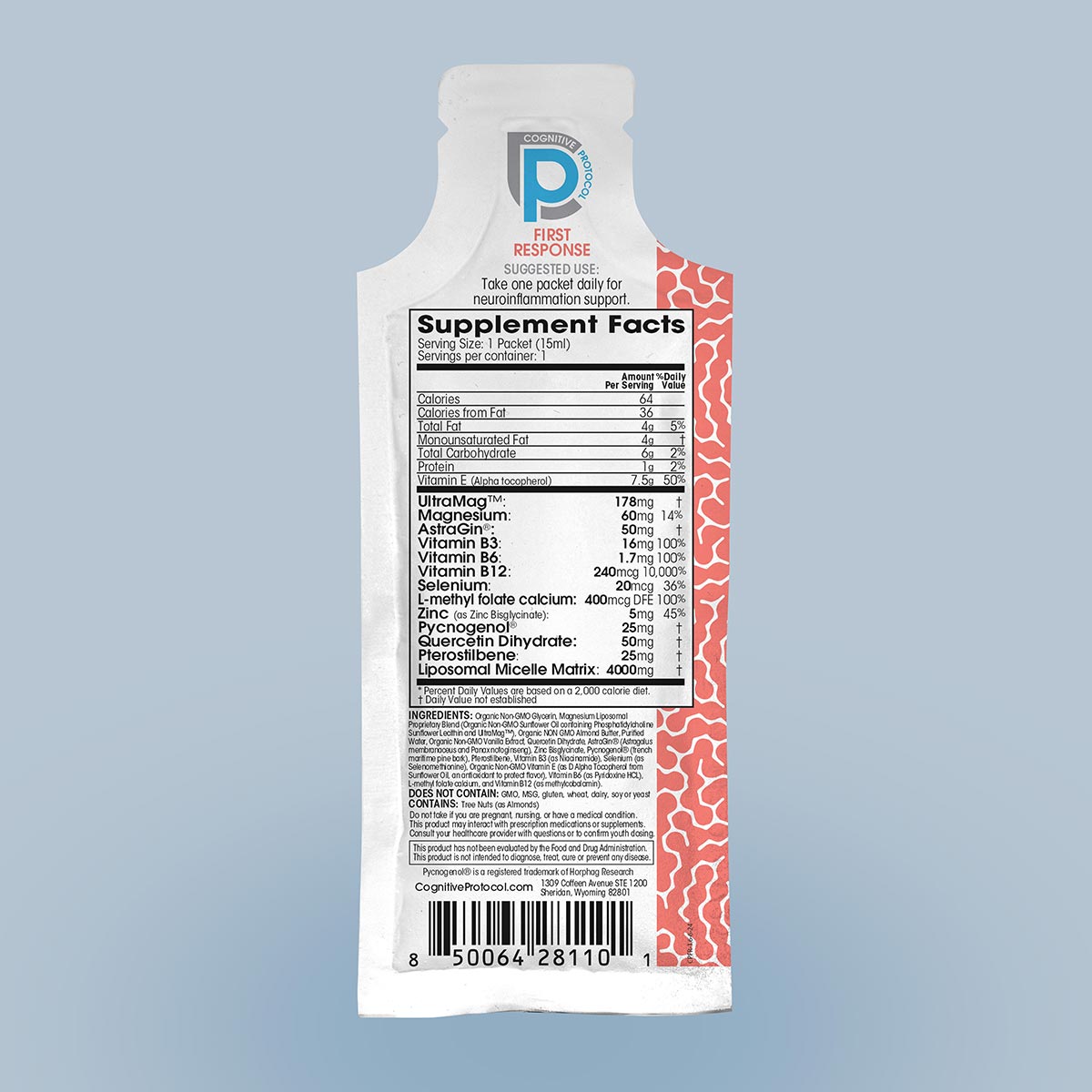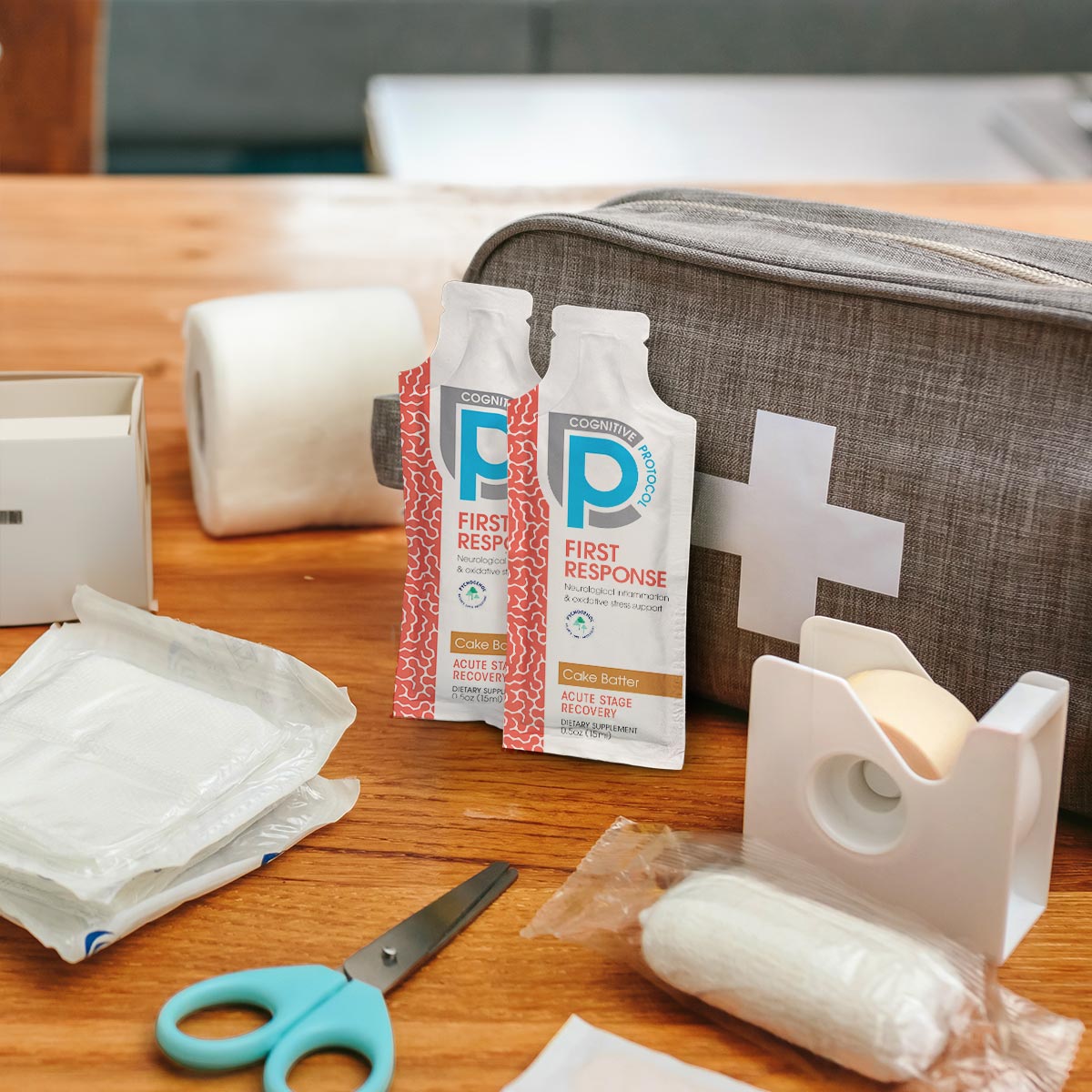First Response
$35.00 — or Original price was: $35.00.$31.50Current price is: $31.50. every 2 weeks
Immediate Support for Brain Health
Introducing First Response, your immediate go-to when your brain needs support in its natural response to neuroinflammation, like during the storm phase immediately following a concussion. Expertly formulated based on clinical studies, First Response was created to provide immediate support after any injury, addressing brain health from multiple angles, with key ingredients to get right to work bolstering your body’s natural response to neuro-inflammation, inflammation, and oxidative stress. Carton of 15 gel packs.


Click to enlarge image

First Response –
Acute Stage Recovery
Trust in the power of science and the quality of our ingredients to provide the support your brain needs when it matters most.
Dosing Example
Take the contents of one packet
Any time of day


Can be taken with or without food
Take one packet immediately for neuroinflammation support, then one packet per day for brain health and resiliency support
for 7-14 days or as directed by a healthcare provider
Explore Our High-Quality, Clinically-Tested Ingredients.

One Gel Pack replaces
all of these pills.
Delicious Cake Batter flavor.
Magnesium Stack with UltraMag™
178mg

This trademarked, highly-absorbable sucrosomial magnesium guards against deficiencies in magnesium that may occur with neuroinflammation.
Quercitin
50mg

A flavonoid antioxidant that supports your bodies ability to scavenge free radicals. Free radicals may damage cell membranes, tamper with DNA, and even cause cell death.
AstraGin®
50mg

Clinical data suggests AstraGin supports nutrient absorption, promotes a healthy gut ecosystem and helps restore gut wall integrity.
Pycnogenol
25mg

Clinical data suggests protective action on synaptic proteins and may reduce levels of neuroinflammation in the brain after a concussion.
Pterostibene
25mg

A compound in the same family as resveratrol; clinical trials have suggested a reduction in neuronal cell death, a decrease in brain edema, and improvements in brain structure.
L-methyl Folate Calcium
400mcg

Supplementing with an active form of folate may counter folate deficiency caused by a concussion. Folate supports optimal brain function and mental health.
Zinc
5mg

Aids your body’s natural recovery after a concussion, supporting cognition and mood.
Vitamin E
7.5mg

May protect against cognitive impairment and aid recovery after a concussion.
Vitamin B3/6/12

B3: May play an important role in energy production and overall brain health.
B6: Supports your body’s natural response to nerve cell inflammation caused by a concussion.
B12: May Improve cognitive functioning and accelerate recovery from traumatic brain injury.
Liposomal
Micelle Matrix
4000mg
Supports optimal bioavailability and sustained release of all the ingredients.


FIRST
RESPONSE
Ingredients:
Organic Non-GMO Glycerin, Magnesium Liposomal Proprietary Blend (Organic Non-GMO Sunflower Oil containing Phosphatidylcholine Sunflower Lecithin and UltraMag™), Organic NON GMO Almond Butter, Purified Water, Organic Non-GMO Vanilla Extract, Quercetin Dihydrate, AstraGin® (Astragalus membranaceus and Panax notoginseng), Zinc Bisglycinate, Pycnogenol® (french maritime pine bark), Pterostilbene, Vitamin B3 (as Niacinamide), Selenium (as Selenomethionine), Organic Non-GMO Vitamin E (as D Alpha Tocopherol from Sunflower Oil, an antioxidant to protect flavor), Vitamin B6 (as Pyridoxine HCL), L-methyl folate calcium, and Vitamin B12 (as methylcobalamin).
Does Not Contain:
GMO, MSG, gluten, wheat, dairy, soy or yeast
Contains:
Tree Nuts (as Almonds)

Choose First Response for immediate, comprehensive support of your brain’s health and function when it matters most.

Magnesium Stack with UltraMag™
Sucrosomial Magnesium is a highly bioavailable sucrosomial complex of magnesium oxide providing 32 percent elemental magnesium. Because the magnesium is covered by a phospholipids plus sucrose esters of fatty acids matrix, its absorption is not impacted by the presence of other nutrients, unlike conventional forms of magnesium. A head-to-head test demonstrated that Sucrosomial Magnesium had faster absorption and 20 percent higher bioavailability than magnesium citrate, one of the most bioavailable forms of magnesium on the market.
Sucrosomial technology is a unique and innovative technique, where the magnesium molecule is conveyed into a liposomal-like structure made up of a phospholipids and sucrose ester of fatty acids (sucresters), called sucrosome. The sucresters act as emulsifiers, surrounding the liposomal-like structure that encapsulates the microelement, thereby increasing its absorption and bioavailability.
Why Sucrosomial Magnesium?
Magnesium deficiency has been associated with chronic-low grade neuroinflammation, since its typical function in the brain is to provide assistance in activating degradative enzymes that can break down inflammatory cells. As a result of magnesium deficiency, these proinflammatory cells are able to overproduce and have continued activation which can cause damage within the brain. Neuroinflammation has a number of negative effects on the body, some of which include headaches, blurry vision, brain fog, fatigue, and even depression and anxiety. All in all, consuming magnesium and making sure that you have healthy levels of this nutrient can help reduce inflammation in the brain that could lead to disease.
Links to clinical data
Micronutrient Inadequacies in the US Population: an Overview
Magnesium bioavailability after administration of sucrosomial® magnesium: results of an ex-vivo study and a comparative, double-blinded, cross-over study in healthy subjects
A randomized cohort study of the efficacy of PO magnesium in the treatment of acute concussions in adolescents
A Review of Electrolyte, Mineral, and Vitamin Changes After Traumatic Brain Injury

Quercitin
Quercetin belongs to a group of plant pigments called flavonoids that give many fruits, flowers, and vegetables their colors.
Flavonoids, such as quercetin, are antioxidants. They scavenge particles in the body known as free radicals which damage cell membranes, tamper with DNA, and even cause cell death. Antioxidants can neutralize free radicals. They may reduce or even help prevent some of the damage free radicals cause.
Why Quercitin?
Quercetin has been shown to have neuroprotective effects and to improve cognitive function in animal studies. These findings suggest that quercetin may have potential benefits in reducing the damage caused by neuroinflammation and improving brain health. Studies have also shown that quercetin can reduce the production of pro-inflammatory cytokines and have anti-inflammatory effects, suggesting that it may have potential benefits in reducing the cellular changes that occur during inflammation.
Links to clinical data
Quercetin in Animal Models of Alzheimer’s Disease: A Systematic Review of Preclinical Studies
A Flavonoid on the Brain: Quercetin as a Potential Therapeutic Agent in Central Nervous System Disorders
The Potential Benefits of Quercetin for Brain Health: A Review of Anti-Inflammatory and Neuroprotective Mechanisms

AstraGin®
AstraGin® is a patented, plant-based compound providing full-spectrum gut support through enhanced absorption, microbiota and immune cell viability, and supporting a healthy intestinal wall environment.
Why AstraGin®?
AstraGin® enhances nutrient absorption by up-regulating nutrient transporters, such as CAT1, SGLT1, and FR. AstraGin® restores gut wall integrity by triggering an anti-inflammatory response and activating the mTOR pathway for rapid intestinal stem cell migration and differentiation in the inflamed intestinal mucosal barrier (epithelial cell and tight junction). AstraGin® promotes gut ecosystem homeostasis by the symbiotic effect of restoring gut wall integrity and increasing microbiota-immunity communication. Lastly, AstraGin® activates the immune system through the symbiotic effect of improved gut wall integrity and enhanced microbiota-immunity communication. The multitude of cellular and molecular processes triggered by a TBI leads to rapid changes in the gut microbiome. In the immediate aftermath, the motility and permeability of the intestinal wall are disrupted, shaping and being shaped by changes in microbiota composition as well as activation of immune cells. Studies in both animals and humans have demonstrated that TBI significantly affects the abundance and diversity of bacterial species, resulting in gut dysbiosis.


Pycnogenol
Pycnogenol, a compound of natural chemicals. It comes from the bark of a European pine tree, is an antioxidant that helps protect cells from damage.
Why Pycnogenol?
Current studies demonstrate substantial beneficial effects of treatment with the combinational bioflavonoid PYC following moderate TBI. This natural compound significantly altered some of the secondary injury cascades such as reducing oxidative stress in both the cortex and hippocampus. Treatment with this compound protected key synaptic proteins and reduced levels of neuroinflammation in these same two regions of the brain.
Links to clinical data

Pterostibene
Pterostilbene (PTS), a compound most abundantly found in blueberries, is a natural analog of resveratrol. Several plant species, such as peanuts and grapes, produce PTS. While resveratrol has been extensively studied for its antioxidant properties, recent evidence also points out the diverse therapeutic potential of PTS. Several studies have identified the robust pharmacodynamic features of PTS, including better intestinal absorption and elevated hepatic stability than resveratrol. Indeed, due to its higher bioavailability paired with reduced toxicity compared to other stilbenes.
Why Pterostibene?
Pterostilbene exhibited a neuroprotective effect against cerebral ischemia in rats via anti-inflammatory mechanism.
One study demonstrated that pterostilbene reduced neuronal cell death, brain edema, improved brain architecture, and exerted anti-oxidant effects by reducing ROS and regulating Nrf2 and HO-1 signals. Furthermore, pterostilbene regulated NF-κB signaling and the PI3K/Akt/mTOR-JNK pathway. These observations propose pterostilbene as a potential therapeutic compound that could be explored further in the treatment of neonatal HI brain injury.




